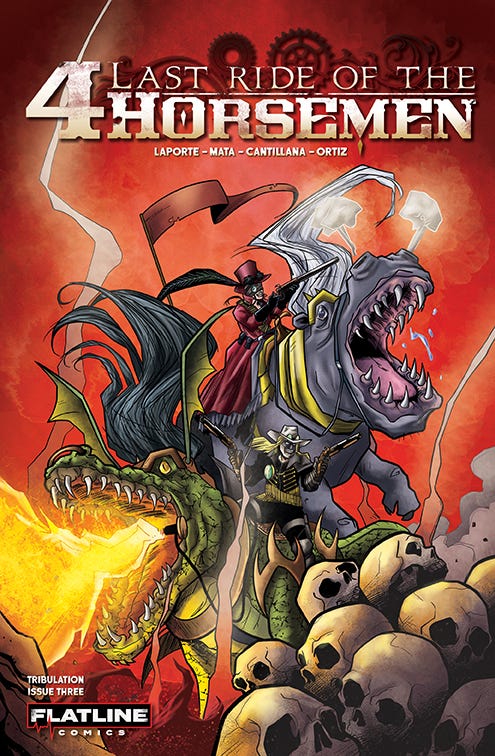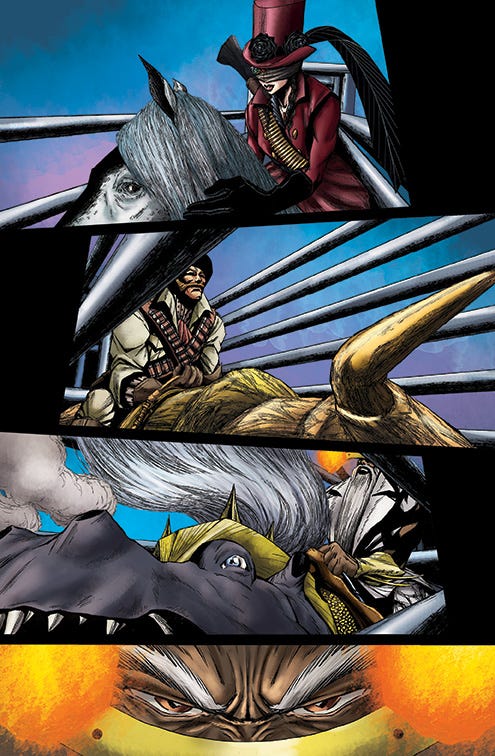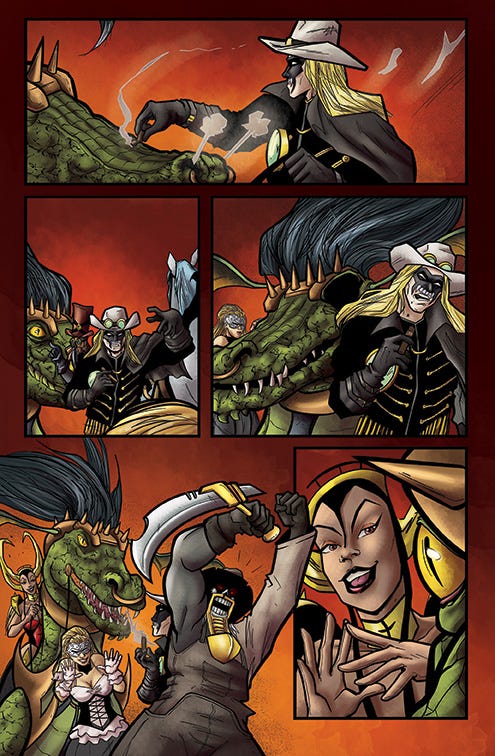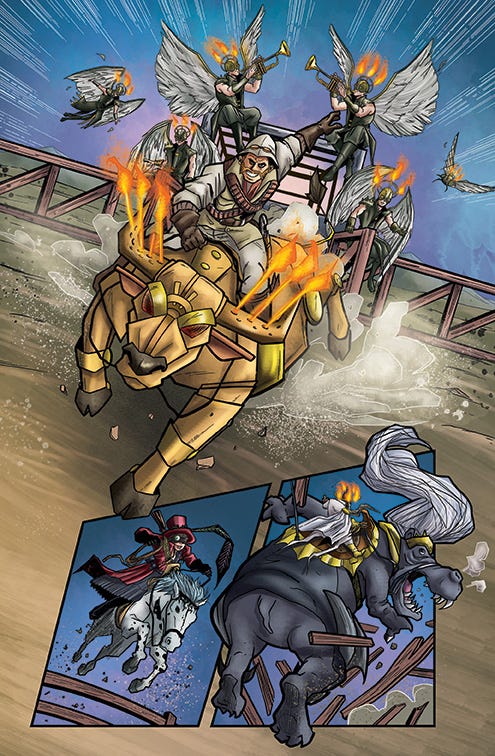Is It Okay to Change Artists on a Self-Published Comic Mid-Stream?
Sometimes, change isn't just preferred. It's necessary.
Over the years, I’ve written at length about my long-form steampunk western horror, Last Ride of the 4 Horsemen and its meaning to me beyond simply the creative. My partner in making that book, artist and designer (and actor) Nathan Smith, passed away unexpectedly several year ago, and it matters to me to finish this series in tribute to him. The biggest challenge has been finding a consistent and productive artist to take over the series.
The point of this post is not to belittle or blame anyone. Rather, my intent is to obviate and address an all too common problem faced by self-published writers and creators who pay artists for their work. This is not finger-pointing, but problem-solving.

Let me run down the sequence of events that transpired with artists on this project over the past several years:
Nathan’s replacement was selected from an email sent to me soliciting comics work (yes, I really look at all those). He finished half of one issue and then all of the next, then quit.
For the next 4-issue series, I hired an art/color team after a search via a Facebook comic artists group. They finished two issues but were using a different finishing line artist on the second, and art quality and delivery time diminished severely. I terminated the contract.
Again, I hired an artist who solicited work from me via email, after he finished an unrelated project for me. He completed four issues with wildly varying delivery intervals, but I tolerated it, including long gaps with no communication, because the art quality was so damned good. However, from January to May of 2025, I received one page in total after prepaying for five pages. I was then promised an escalated delivery schedule in order to finish the latest book by July (six months after the last one). I only received four more pages by July. Regrettably, I terminated the contract.
I replaced him with an artist whose work I found in the same, previously referenced, Facebook group at the beginning of July. The new guy has completed ten pages and the above cover in a month, and, barring any issues, I intend to use him to finish the last issue of the series by January.

In each case, I tried to make these arrangements work, despite delays and challenges. I kept open the lines of communication. I advanced payments when artists faced personal and professional challenges. I moved deadlines to accommodate artists’ other work and obligations. I paid within 24 hours of art completion 100% of the time.
I know, as an experienced self-publisher and as someone with professional managerial experience in a large organization, I did everything in my power to make these partnerships work until I was out of options.
There is a perception in indie comics land that changing artists mid-stream is bad for business because readers and backers don’t like the shift in styles. Is this true? I remember reading Uncanny X-Men as a teenager in the 1980’s, and I recall feeling let down if there were fill-in issues by artists other than Romita, Jr. or Silvestri (unless it was comics god, Barry Windsor-Smith).
But does that hold true for indie and/or self-published comics, and does it matter if I, as the lone funding source and decision maker, have no choice because the art isn’t being delivered?
In the final analysis, the answer is NO. It doesn’t matter if the change in artists is disappointing to readers/backers, because they (and, especially, I) will be more disappointed if there’s no art AT ALL being created. It sucks. Nobody wants to hear it, but that’s the truth. Sometimes change is the only option, but, in these cases, it’s also the BETTER option.

You can see the definite change in styles over the Last Ride pages I’m sharing today, but it’s a necessary peccadillo of the project now, and not the first of its kind. There are two other points over 11 issues in which the art style shifted permanently and rather abruptly, but I had no choice in the matter in any case. I do feel using the same colorist somewhat ameliorates the style shift.
After going through this several times over the years, my advice to other self-publishers is this:
Do it. Make the change. Rip off that Band-Aid and do it. When you’ve held up your end of the contract and more, don’t let an artist’s struggles or failures or negligence (or some combination of the three) harm your product. Build a termination clause into your artist contract and stick to it, just as you stick to your side of the obligation fence by making payments on time, etc.
We are all professionals here, and we should hold each other accountable to act as such. When the change must be made, choose a talented and reliable replacement artist regardless of the style shift and finish your story together with mutual respect and a synergized product you’ll both be proud of.
Hard truths, baby.
Last Ride of the 4 Horsemen: Tribulation 3 releases (finally) in September. It’s the penultimate issue in this 13-book epic, and I can’t wait to share it with you.
Thanks for making comics with me!
Kevin






Absolutely no issue with changing artists, for the reasons you said. I think the VAST majority of the times, the artist gets changed because of 1) they quit, or 2) their quality of work falls off / they stop delivering in a timely fashion. As independent creators, our ability to keep going depends on making sure that our release schedule stays on track. If a hired individual doesn't respect that, OR their life circumstances get in the way, then THEYVE already made that choice for us. This doesn't mean to flippantly move from person to person. We do everything we can to NOT make changes until absolutely necessary.
People need to remember, CREATORS are the ones footing the MASSIVE bill to create this. Artists are being paid by us to do a job. If they're not doing the job, we have no choice but to move onto someone who will.
People may be disappointed in a artist change mid book on a mainstream title but it's not a dealbreaker. Meanwhile, an indie book doing the same thing will be looked on as unprofessional and dropped. It's just another thing that proves people will hold indie books to a higher standard on criteria they take as "business as usual" from big publishers.